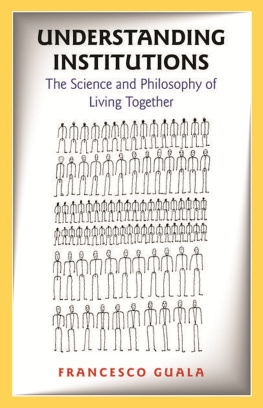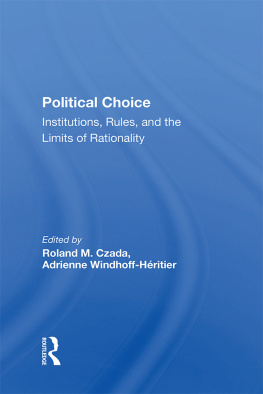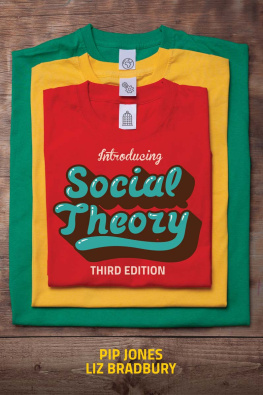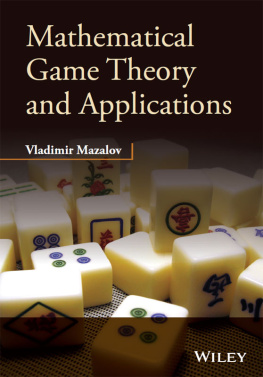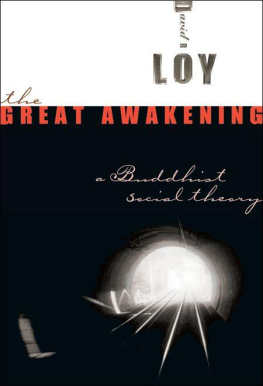
UNDERSTANDING INSTITUTIONS
UNDERSTANDING INSTITUTIONS
The Science and Philosophy of Living Together
Francesco Guala
PRINCETON UNIVERSITY PRESS
PRINCETON AND OXFORD
Copyright 2016 by Princeton University Press
Published by Princeton University Press, 41 William Street, Princeton, New Jersey 08540
In the United Kingdom: Princeton University Press, 6 Oxford Street, Woodstock, Oxfordshire OX20 1TR
press.princeton.edu
Jacket image courtesy of Andrea Branzi, from Genetic Tales
The images that appear between chapters are reproduced by kind permission of Andrea Branzi and Alessi. Alessi s.p.a., 1998.
All Rights Reserved
Library of Congress Cataloging-in-Publication Data
Names: Guala, Francesco, 1970 author.
Title: Understanding institutions : the science and philosophy of living together / Francesco Guala.
Description: Princeton, NJ : Princeton University Press, 2016. | Includes bibliographical references and index.
Identifiers: LCCN 2016004753 | ISBN 9780691171784 (hardcover)
Subjects: LCSH: Social institutions. | Social interaction.
Classification: LCC HM826 .G815 2016 | DDC 306dc23 LC record available at http://lccn.loc.gov/2016004753
British Library Cataloging-in-Publication Data is available
This book has been composed in Linux Libertine and Goudy Sans
Printed on acid-free paper.
Printed in the United States of America
1 3 5 7 9 10 8 6 4 2
Contents
Preface
T here is general agreement among social scientists that institutions are crucial determinants of economic growth and human flourishing. The consensus is that they are more important than natural resources: a well-organized group of people can prosper in a harsh environment, while badly organized societies go astray even in rich and generous ones.
The bad news is that institutions are fragile: they cannot be taken for granted and require constant care. There are plenty of examples one could mention: the political institutions of my own countryone of the success stories of the past centuryhave been shuddering dangerously for almost two decades. The recent economic crisis has exposed the vulnerability of the institutions that govern global finance, and in some countries has put democracy to test, placing unelected technocrats in charge of reforms against the will of the people. These technocrats are often appointed by institutions like the European Union, which is itself in a state of crisis, according to many pundits and politicians.
These claims are familiar, and yet somewhat mysterious. What exactly is in a state of crisis? What are these things that must be reformed? Ultimately, what is an institution? If we do not know what institutions are, how can we possibly hope to improve their performance?
These are both philosophical and scientific questions. Philosophers have been asking What-is-X questions since the time of Socrates at least. Over the centuries however many of these questions have been taken over by science. If we want to know what is matter, or light, or life, we now ask physicists and biologists as well as philosophers. Similarly, questions about the nature of institutions cannot be answered satisfactorily without the help of science. So an important goal of this book is to offer a coherent picture of the fundamental architecture of modern societies, combining the insights of social scientists and philosophers who work on this topic.
Understanding Institutions aims at a broad audience: I have tried to write it in such a way that it could be understood by open-minded economists, political scientists, sociologists, anthropologists, and philosophers. I stress open-minded because the concepts and terminology that I use do not always fit those that are commonly employed in some of these disciplines. But it is inevitable, given the lack of unity that thwarts interdisciplinary research in the behavioral sciences. In fact one of my goals in writing Understanding Institutions was to introduce a unified theoretical framework that would facilitate conversation across disciplines in this important area of research. Another goal was to show that an adequate understanding of the nature of institutions helps resolve old conceptual and methodological problems in the philosophy of social science. While some of these problems simply disappear, others become more tractable once they are seen from the perspective of the unified theory.
The book owes a lot to numerous friends and colleagues whom I have had the luck to meet and to work with over the years. My first debt goes to my former colleagues at the University of Exeter. As a graduate student I found philosophical debates on the nature of society rather uninteresting, but I began to change my mind when Barry Barnes and Nigel Pleasants introduced me to the Wittgensteinean tradition in the philosophy of social science, and proved by way of example that my preconceptions were wrong. Supervising Mattia Gallottis doctoral dissertation on collective intentionality was another crucial formative experience in the same period; I am grateful to Mattia for the numerous conversations that we have had and continue to have on these topics.
An important event for the genesis of this book was a seminar on rules and institutions that Frank Hindriks gave in Milan in the summer of 2011. In his doctoral dissertation, written a few years earlier, Frank had shown how to derive constitutive from regulative rules. Although I had read his dissertation back then, however, I had spectacularly failed to see the importance of this result. When Frank presented the same ideas in Milan, I realized that they could be used to build a unified theory of institutions based on the game-theoretic notion of correlated equilibrium. The unified theory has been outlined in two articles coauthored with Frank, and constitutes the bulk of the first part of the book. Although Frank and I do not agree on everything, it is fair to say that this book would have been a lot different without his contribution.
Over the years many other friends and colleagues have helped me. Cristina Bicchieri, Francesca De Vecchi, Natalie Gold, Conrad Heilmann, Muhammad Ali Khalidi, Arto Laitinen, Uskali Mki, Chrys Mantzavinos, Luigi Mittone, Ivan Moscati, Fabienne Peter, Giacomo Sillari, Corrado Sinigaglia, Luca Tummolini, and many anonymous reviewers have provided useful comments on specific topics. I owe particular gratitude to a group of colleagues who have read the semifinal draft of the manuscript, have given constructive suggestions, and have spotted a number of mistakes that I had overlooked. They are, in alphabetical order, Matteo Bianchin, Frank Hindriks, Chiara Lisciandra, Olivier Morin, Michiru Nagatsu, David Teira, Enrico Terrone, Jack Vromen, and Jesus Zamora Bonilla. The published version is far superior to its predecessor drafts thanks to their comments. Im aware that I have been unable to fully meet their expectations, but I hope they will forgive me: some of their demands were very demanding indeed.
Geoffrey Hodgson organized a wonderful symposium on one of the papers that Frank and I wrote together, with commentaries by Masahiko Aoki, Ken Binmore, John Searle, Vernon Smith, Bob Sugden, and Geoffrey himself. I am very grateful to all of them for pushing us to correct and clarify our views on institutions. I am grateful also to the Ecole Normale Superieure for its hospitality in Paris during February 2014, and for the opportunity to give a series of seminars on the topics of the book. Daniel Andler, Mikael Cozic, Brian Hill, Elizabeth Pacherie, Cedric Paternotte, and some very clever graduate students offered useful comments back then and on subsequent occasions.
Next page
